How to make player choices interesting
I admit that I didn’t care much about player choices up until recently. A strongly directed experience is usually better than a diluted one with a few (often meaningless) options to pick. The player gets to see only one story at a time, so it better be as good as possible. And frankly, most modern games don’t do choices very well either, usually limiting them to binary moral dilemmas tied to some simplistic karma system.
Working on Cinders required me to revise my approach, though. As a visual novel, the game is all about the choices and experiencing a different story each time you play. Without this aspect, you would be better off just reading a book.
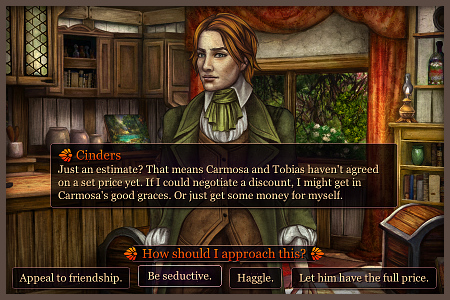
It made me think a lot about what makes a good branching storyline, and how to make player agency as enjoyable as possible. As I wrote before, I’m a competitive beast, driven by the ambition to 1-up what’s already there, and I really wanted to get this aspect right.
I started forming a loose list of guidelines we want to follow, based on what worked (or didn’t work) in other games I played, and on our own experimentation.
Make all choices viable.
I recently played Deus Ex: Human Revolution. As its predecessors, the game makes big fuss about the player’s freedom. Jensen — the protagonist — can be a ninja, a diplomat, a hacker, or a killing machine. You can play however you want. In theory. In reality… not so much.
At first, I wanted to be a common sense Jensen. Stealthy when necessary, but not shying away from direct assault if the odds are in his favor. When I finished the first mission, I had around 4k experience, no level ups, and I was scolded by every NPC around.
I decided to try again using the stealthy approach, to see how it changes things. This time, I knocked every opponent down silently, checked every hidden vent shaft, and avoided any direct confrontation. It actually ended up being easier (and more tedious) than the first playthrough, as the AI isn’t very bright and your character is pretty fragile in combat.
I finished the first mission with 9k experience, two level ups, and two unlocked small side-quests. Right…
For a game that encourages freedom of choice, it surely made one of the alternatives way more optimal than the other. I want to avoid that in our games.
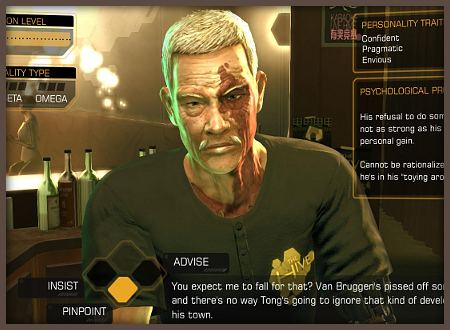
I’ve set myself a goal to make every choice viable and interesting to pick. Especially as it’s a story-based game. There’s no “strategy” or “challenge” here. You’re just experiencing a certain story and shaping it to your liking. One person’s story should be different than the other’s — but not better or worse.
It doesn’t mean we don’t have any “bad” options, or ones that may not be the right course of action for the presented circumstances. But we attempt to make them viable by allowing them to create interesting situations or give new insights into some character’s personality. We don’t want the player to ever feel like they just picked the wrong option and should load the game. Whatever they do, it should still make for a good story.
A simple example of this approach is right at the start of the game, when the Stepmother tasks Cinders with retrieving something from the local merchant. On her way, Cinders may visit several places, meet some characters and progress a few story arcs. Or she may just skip right to her destination and get back.
Clearly, the second option makes the player see less of the game’s content and could be considered sub-optimal. To prevent that, we’ve made it so that if Cinders gets back early, she manages to impress the Stepmother with her efficiency, which can lead to a whole different story arc. So while the player may have sacrificed a part of the content, they are rewarded with some cool scenes that they would otherwise miss.
Allow for flavor choices.
By “flavor”, I mean choices that don’t have much gameplay weight but allow you to add some touch to your character’s personality. Role playing, basically.
One thing I adore in the first two Fallouts (one of my favorite games of all time, even if they didn’t age very gracefully), is that they had a very broad set of dialogue options for almost every conversation. Even when accepting a quest, you could reply in many more ways than a simple “Yes” or “No”. You could be heroic, cynical, a tough mercenary, an annoying wise guy, or you could try to seduce the guy for more info and rewards. It still lead to the same quest, but allowed you to shape your character’s “image” to your liking.
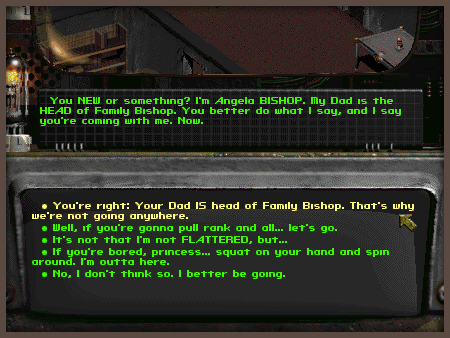
Availability of many of these options depended on your stats and karma. A stupid character could barely make a coherent sentence (playing a total dumbass was a great challenge in itself), a charismatic genius had a broad range of differently flavored responses, while an expert scientist could ask for some advanced technical details.
It went a long way in allowing for some good old roleplaying, and gave the game a huge replayability factor. I played it as a classic Mad Max-like mercenary, as a sleazy female manipulator, as a focused martial artist in vein of Bruce Lee movies, and as a psychotic drug-addicted killer.
AAA games don’t do that anymore. They usually use a much simpler solution, where you have three clear answers to every situation — good, bad, and neutral. Often tied to some karma system.
It’s understandable. These games need to keep mass-market appeal, and mass-market doesn’t like to read too much. It would also cost a crazy amount of money to record and animate all these different dialogue options — something that older games didn’t have to worry about as much.
Cinders — and visual novels in general — are not big budget AAA molochs however, and we have way more flexibility here.
I want to give players a chance to play any Cinders they want. Differing from other people’s interpretation of Cinders. Not only in actions but also in the way she thinks and speaks. Besides plot-critical choices, we offer many that are simple role playing.
For example: when one of the stepsisters teases Cinders by implying she surely dreamed about a handsome prince or something equally silly, we get the option to either ignore her remark, take offense at it, admit it may be true, or turn it against her. Does it alter the story in any meaningful way? Well, it adds some points to a secret variable storing Cinders’ personality, that is later used to determine the ending, but not much more.
It’s too minor to significantly affect the plot, but it allows the player to define Cinders as a romantic dreamer, disillusioned realist, or something in between. It doesn’t cost us much to add these few extra lines, but it adds actual value for the player.
Leave all important decisions to the player.
I’ve made this rule after playing Bionic Heart. It’s a sci-fi romance VN by our friends at WinterWolves. I went through it as a part of my research, when we were just starting out. It was fun overall, but there was one moment that really irked me.
The plot resolves around a mysterious cyborg (who happens to be a beautiful woman… of course), who appears at the protagonist’s door one day. It results in an investigation about the cyborg’s origin, and potentially in a somewhat creepy romance.
I was aiming for the romance option, trying to please the robot by discovering as much about her past as possible. Pretty far into the game, when I got our “relationship bar” to the max, the cyborg started to behave clearly affectionate towards the protagonist. It seemed like the romance plot was clearly heading for its resolution…
And then, suddenly, my character stated that he doesn’t find her attractive anymore, now that he knows how she works. And ended the relationship. This wasn’t a choice made by me — the game just told me: “Sorry, bro. You changed your mind”. I was pissed. Why an important decision is made for me, when I was clearly in control of my character up to this point?
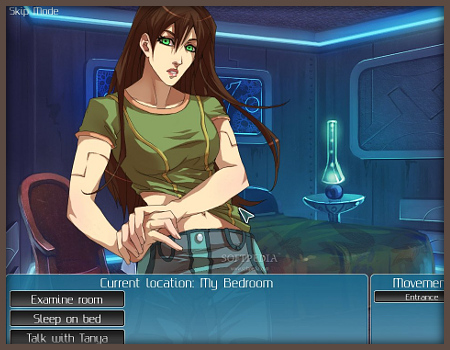
I try to be very careful not to make the same mistake by leaving all the important decisions to the player. It’s not easy sometimes. Especially when I want Cinders to be at some place and time in every playthrough, regardless of the chosen option. Some cool scenes actually emerged from moments when I just couldn’t think of anything, and had to include the “what if the player doesn’t want to go there” option.
Choices should be clear.
This is a simple one. I hate when I pick an option in a game, thinking this will make my character do A. And then he ends up doing B, because the designer’s interpretation of what’s my choice was different from mine. Sometimes it’s even intentional. Supposed to keep the players on their toes, add a bit of realism to the game. It ends up with a short trip to the Load Game menu either way.
Some of those L.A. Noire interrogations are a good example here. Sometimes, you clearly think you just caught your witness lying about something. But when you press the “Lie” button, the protagonist suddenly becomes strangely violent and accuses the subject of something completely unrelated, leaving you with a funny WTF impression on your face.
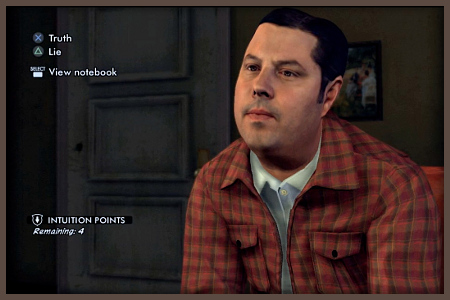
To some extent it’s unavoidable. People think differently and make different connections in their minds. You can’t predict if what seems like a transparent decision for you is going to be as transparent for someone else. But we’ve made a rule to at least try to make it always clear what you are choosing and what the outcome may be.
If you decide to be nice to someone, it will probably have a positive effect on your relationship. If you click “Be seductive” you will do just that. And if choosing a particular option may have significant repercussions, we try to indicate that it’s a possibility through earlier dialogue.
I think it’s important to let the player feel they are in full control of their character’s actions. It’s the visual novel equivalent of making sure that controls in a platformer game are tight.
Acknowledge player’s choices.
Playing games is largely about the rewards. In casual games, every right action is accompanied by a nice effect, pleasant sound cue, and an increase in score. In Mario, collecting 100 coins rewards you with a 1-up. In RPGs, you get experience points for killing monsters. And so on.
It makes game more entertaining and — well — rewarding to play. We like our efforts to be appreciated, and it makes us want to come for more.
It gets a bit less obvious in story-centric games. Often, the story or the dialogue itself are the reward for your actions. A simple and very direct example is an NPC thanking you for saving his village in an RPG.
A more subtle — and often more rewarding — method is to add small acknowledgments of player’s actions to otherwise mundane dialogues.
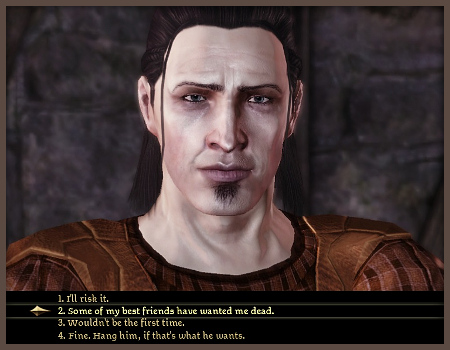
We keep track of most of the decisions the player makes, and add some extra lines here and there. For example: in one scene, the Prince is talking with the Captain of the Guard about his problems with finding the right wife. It’s just a short cutscene that goes always in the same way and serves to establish the Prince.
However, if the player chose the course of action in which Cinders meets the Captain, it makes him add a few lines about an interesting girl he just met. It serves no plot purpose, but it feels nice that the game acknowledges what you did.
It’s like when an old friend suddenly remembers about your birthday and calls you with wishes. A simple gesture that doesn’t cost him much but makes you feel happy nevertheless.
Of course, I don’t want to get all cocky and say that this is the definite list of what makes player choices in games good, or that it works for every game out there. We’re still figuring this out ourselves, and there’s certainly a lot to learn yet. I bet that after we release Cinders, we’ll discover a whole world of issues that we haven’t even thought of yet.
Still, I thought it may be worth to share our list. Maybe you guys will find it helpful, or maybe you have something to add.
winterwolves wrote a comment on: October 21, 2011 at 3:55 pm
How dare you criticize my awesome Bionic Heart you FOOL! 😀
Jokes apart yes, probably I should have allowed the player to decide if finding out how Tanya is built was so revolting to make him forget about a love interest for her, or still be charmed by her.
I supposed that everyone would agree with me but, of course, I was wrong about it. In other paths of the game there are events that are beyond your control (like when Tanya kills Helen) but in any case is not a decision of the player, is just a succession of events.
Good luck with Cinders, it seems is going to be a very complex/detailed game! 🙂
TeeGee wrote a comment on: October 21, 2011 at 4:05 pm
Yeah, like I wrote, it’s sometimes really hard to guess how the player’s interpretation will differ from your own. I think that slips like that are unavoidable to some extent, but it’s good to keep it in mind, to try to avoid such situations.
Also, Bionic Heart was still fun as hell :D.
winterwolves wrote a comment on: October 21, 2011 at 4:09 pm
Thanks !
But indeed preventing a possible love interest was a mistake – I mean for a VN/Dating Sim love interests are very important. one thing is if you miss some scenes, that’s OK, but cutting out a love interest completely was a bad idea!
Ixolite wrote a comment on: October 21, 2011 at 8:12 pm
It is a very good point you raised about acknowledging player’s choices.
This is something that Alpha Protocol did very well – it really made me feel all tingly inside when the characters I spoke to referred to my earlier actions. It gave me a sense of being there and making an impact on the world and events. It also made every playthrough unique in that aspect – my playstyle affected how the same characters were speaking to me, I knew that I am going through similar, yet different story.
There is nothing I hate more than learning that my choices have no real meaning in the game. It completely breaks immersion.
I think that KoTOR 2 was the worst case in that regard – no matter what I did, my companions always agreed with my point of view, even if they said something completely opposite just moments ago.
Gareth Fouche wrote a comment on: December 9, 2011 at 6:43 pm
Nothing to add but that your guidelines are dead-on and should be tattoo’d onto the foreheads of all writers of RPG/Branching Storyline games. 😉
Josh W wrote a comment on: February 26, 2012 at 9:14 pm
I think your approach to story lines is a pretty good one, rather than balancing them to irrelevancy (a mistake I’ve made before now) you add compensation to the weaker choices that fits the situation.
A big strength of this approach is that it builds up depth of interaction; instead of assuming that everything should have the same type of benefits, you often find yourself creating new and different benefits.
A danger in this approach is that it implies new forms of causality; if this aspect of a decision mattered this time, will it matter later? In this context that shouldn’t be too much of a problem; people are inconsistent in what matters to them, so sometimes time taken will be relevant, other times it won’t.
In more systemic games that can lead to programming workload increasing over the course of a project, as you add more nuanced consequences to match the expectations you have made, on the other hand, it can also lead to the game design developing a “mind of it’s own” in a really creative way, as this starts suggesting new alternative plot twists and game elements for you.
TeeGee wrote a comment on: February 26, 2012 at 9:35 pm
Yeah, it’s important to set some limit of possible choices and routes. Otherwise you end up with a game that’s simply too big to make. I think that’s given. Even in a VN, which has only one core system and all the content is just text, it still takes a lot of time to write all the routes.
The point is to make sure that all the choices you offer are similarly viable and interesting, not to offer thousands of them. It also means you have to be careful with the plot. If you include a scene in which the player could want to act differently than the script assumes, and you offered similar choices before, you may run into trouble.